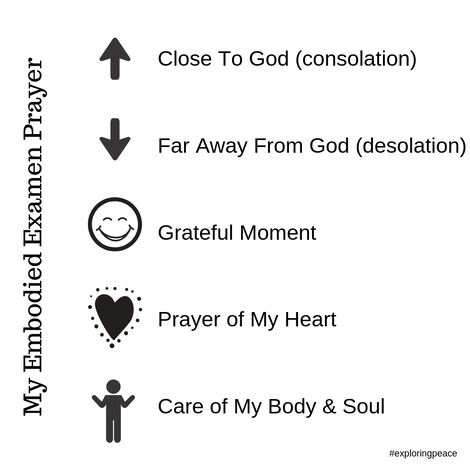 During my spiritual direction practicum work almost ten years ago (I still can’t believe how quickly time passes as we age, can you?), I was introduced to St. Ignation (1491-1556) and the Prayer of Examen as a daily spiritual exercise. I first learned of this practice in a Companions for Christ study series but had not embraced the practice as my own discipline. Now a decade later, I find my day is almost incomplete without this daily ritual. Why, you ask? Like no other spiritual practice, it invites me to notice God’s activity - in all aspects of my life. By pausing and taking a few moments at the end of each day to reflect and notice those moments I’ve either felt near or far from God, some patterns begin to emerge. Ignition spirituality invites us to notice both consolation (when we feel drawn toward God, inspired, connected, fulfilled) and desolation (when we feel far away from God, drained, disconnected, turned inward). As I look back in my planner (where I log in just a few words my daily reflections), I begin to notice themes. I notice those “close to God” moments often become repetitive. For instance, “I felt close to God today while leading yoga & meditation class” or “in nature walking with my spouse” or “during a soul talk with a friend” that day. I may have felt far away from God when I “failed to be present with a friend” or was “juggling too many hats” or “overwhelmed by caregiving” that day. This ancient practice is one that St. Ignatius encouraged the Jesuits to practice twice daily (both at noon and at the end of the day). While I have found that once a day (at the end of the day) works best for my life, you may wish to explore it more often as done historically or even simply once a week. Below, I’ll share my own “once a day” method for examining my life with God and an additional step I've added to the ancient practice. This example is how the Prayer of Examen has manifested in my own life. I’ve made it a simple practice by using symbols in my planner and write only words or phrases. I find that if I have expectations for myself of journaling long paragraphs, I do not follow through with this practice on a regular basis. Some people reflect with these questions in silent prayer only without writing it down. However, I find that reflecting on paper allows me to notice patterns and themes in my life with God. The concept is simple, no matter how it’s structured. Ignatius invites us to become aware of God’s presence, review our day with gratitude, and commune with God as we look ahead to each new day of noticing our near and far away moments. I’ve added a step to this prayer practice to remind me that spirituality is an embodied journey. So, I also name one way in which I’ve cared for my body and soul to draw nearer to God that day - on purpose. The last step has become a vital one to help me move beyond spirituality as a concept in my mind and embody it with my whole self. My practice looks like this: Embodied Examen Prayer Up Arrow: When did I feel close to God today (a moment of consolation)? Down Arrow: When did I feel far away from God today (a moment of desolation)? Smiley Face: What moment am I most grateful for today? Heart: What is the prayer of my heart, for what would I like to pray to God about from today? (Note: this may be something already named from the day, or something entirely different) Stick Person: What did I do to care for my body and soul to draw nearer to God on purpose today? As I write this to share with you during Holy Week, I’m reminded of the emotional highs and lows of journeying with Christ. Ignation spirituality invites us into an ancient practice of noticing - the highs and the lows. This practice is as powerful today as it was hundreds of years ago for the Jesuits. If you’re intrigued with this ancient practice, why not explore this prayer during Holy Week? If you want to read more on Ignitian Spirituality, I’ve linked a couple of books from some of my favorite teachers. The second book offers wonderful insight on sharing this practice with others - including the children in your life. This practice is easily adaptable to be shared with small groups or around the dinner table with your family. How will you practice the Examen? Inner Compass by Margaret Silf Sleeping with Bread by the Linns May you discover God in the consolation and desolation and be reminded of God's nearness this Holy Week! Comments are closed.
|
Whitney R. SimpsonClick to connect: Categories
All
Content @ 2010-2023
Whitney R. Simpson Exploring Peace Ministries, LLC |

 RSS Feed
RSS Feed
